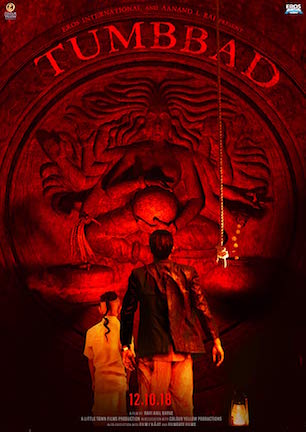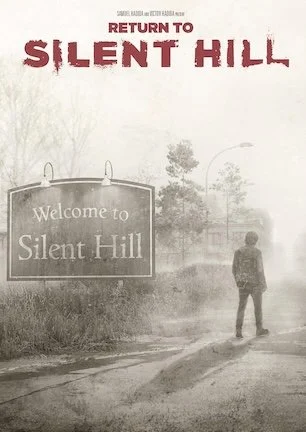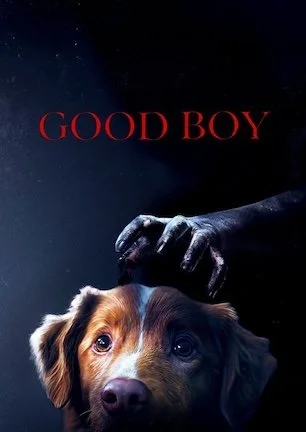Studio: Eros International
Director: Rahi Anil Barve, Anand Gandhi, Adesh Prasad
Writer: Mitesh Shah, Adesh Prasad, Rahi Anil Barve, Anand Gandhi
Producer: Sohum Shah, Anand Gandhi, Mukesh Shah, Mitesh Shah
Stars: Sohum Shah, Jyoti Malsh, Deepak Damle, Anita Date, Ronjini Chakraborty, Mohd Samad
Review Score:
Summary:
An ancient curse plagues a greedy man’s family in unfathomable ways across four decades of India’s history.
Review:
I almost avoided “Tumbbad.” A delicate balance exists between movies I want to see and movies an audience wants to read about. And having operated a genre movie review site since 2013, I can tell you, foreign language films simply do not drive traffic.
Whenever trades announce an English-language remake of a popular foreign film, cinephiles take the opportunity to decry Americanization and dub anyone who dislikes subtitles as a philistine. “Just watch the original,” they exclaim.
It’s a deaf ear demand. Perhaps sad but no less true, many people just won’t expend the extra effort to deal with reading while watching a movie.
That fact can influence what films I cover. Given the choice between an Estonian arthouse haunter and a slasher franchise sequel, I’m taking the one that won’t result in content destined to collect digital cobwebs within two days of posting.
Limiting myself to just one of the two features playing night three of Screamfest 2018, I had a choice between “Tumbbad” and “Lost in Apocalypse.” If one of those options were made stateside, the decision would have been a no-brainer. But with the latter in Mandarin and the former in Hindi, I had to watch both trailers and do perfunctory research to determine which one was more likely to be buzzed about in the horror community.
“Lost in Apocalypse” appeared to have a fairly familiar take on zombie fiction as well as a shorter runtime. Paired with a short, “Tumbbad” promised to run two hours and seemed to be a complex period piece involving Hindu mythos, metaphors, and melodrama spanning 30 years. In short, “Lost in Apocalypse” looked to be the safer bet for something that would be widely available on a streaming service in the near future, not to mention easier to dissect as far as writing a review goes.
Then I asked myself, what would I select if I weren’t worried about workload? Do I really want another undead epidemic yarn, or should I roll the dice on something potentially more intellectually and emotionally challenging, even if it means more work and fewer hits? Shouldn’t my motivation be to look outside obvious channels for movies that need more exposure?
Concerns about clicks and time taken to compile notes went out the window. All other considerations being irrelevant, the intriguing trailer told me I wanted to see “Tumbbad.” Instead of my business-minded head, I went with my horror-loving heart. Although I’m currently ignorant of what “Lost in Apocalypse” offers, I’m certain I made the correct call. Had I heard about “Tumbbad’s” greatness secondhand, I would have kicked myself for not experiencing its bone-shaking sounds and incredibly stunning visuals on the biggest screen possible. “Tumbbad” turned out to be engrossing and exhilarating, and I can’t imagine it being outmatched in the realm of Indian genre cinema.
“Tumbbad” begins by briefly recounting the legend of the Goddess of Plenty and her favorite son Hastar. No one has heard of Hastar because of a condition requiring him to be stricken from history. Hastar was remembered however, and the villagers who worshipped him unleashed a curse. Daring to confront Hastar can bequeath one with gold, but there may be a consequence of becoming a monster. “Tumbbad” tells the tale of how one family’s desire for Hastar’s riches plagues its descendants for generations.
Inspired by the works of Narayan Dharap, who was apparently inspired by authors such as Stephen King, “Tumbbad” evokes a faint fairy tale feel by essentially being a morality lesson about greed as a cyclical sickness. Don’t let that deliver an impression of “Tumbbad” being preachy, childish, or unnecessarily sentimental. Even though the film stabs at commentary about gender dynamics, social politics, and old-fashioned human nature as seen through India’s evolution across several eras, subtext stays essential to establishing characters and settings so the story has maximum meaningful resonance.
That’s part of the brilliance in how writers Mitesh Shah, Adesh Prasad, Anand Gandhi, and director Rahi Anil Barve smartly structure their script. “Tumbbad” deals in clichés about misers and misogyny, yet balances familiar themes with ample amounts of endearing emotion.
Vinayak, who remains our guide through the movie’s three different decades, marginalizes his wife and physically disciplines his son, yet isn’t portrayed as a stereotypically despicable dad. His abuse is presented as a product of cultural normalcy for its time more than a direct reflection of inherently awful character. Complexities like this instill conflicting feelings about whether to regard characters with empathy or anger, which is a terrific tactic for capturing an audience’s emotional investment.
To say too much about the story’s specifics wouldn’t be right. Not because “Tumbbad” is twisty or particularly involved. Rather, the background is dense enough that getting the uninitiated to square one requires a mouthful of telling when the movie does a dazzling job of showing. Once “Tumbbad” gets set, the rest of the journey is a straight shot through wicked scares, sweeping cinematography, and directly dialed-in performances that refuse disengagement from the sprawling narrative even for an instant.
It takes nearly no time to forget “Tumbbad” is a film and to become fully transported into its fear-filled fable. Production design genuinely drops jaws, with every realistic detail in makeup, costumes, sets, and props adding countless elements to the illusion of complete immersion in another time and place.
A monstrous witch tearing an iron spike from her face to wield as a weapon. A tree growing out of an immobile living corpse. “Tumbbad” contains numerous nightmarish sights never seen before. Some digital demonry reads as the CGI it is, but complemented by the choking claustrophobia of a spectacularly satanic setting where many memorable moments take place, the movie captures distinctly macabre moods to go with the heartbreaking interpersonal drama at its core. On top of Jesper Kyd’s badass score that I couldn’t get out of my head, I didn’t want to leave the beautifully haunting world of “Tumbbad” and its eternally tortured people.
I considered comparing “Tumbbad” to an American equivalent as a point of reference. But likening it to “The Conjuring” or “It” doesn’t come close to delivering an accurate impression of its mesmeric cinematic scope or rich, big budget feel. It’s not “the Indian” anything. Impressive in imagination, ambition, execution, and effectiveness, “Tumbbad” is a distinct behemoth all its own, and deserves to be regarded as such.
“Tumbbad” may be about dangerous desires associated with gluttony and greed, yet there is another important lesson to be learned. Always take a chance on expanding exposure to horror stories from around the globe. You never know when you might find a terrifying treasure as ghoulishly golden as “Tumbbad.”
Review Score: 95






While the 110-minute runtime could use a trim to maintain more energy, “Redux Redux” is an easy recommend for anyone who enjoys low-key sci-fi.